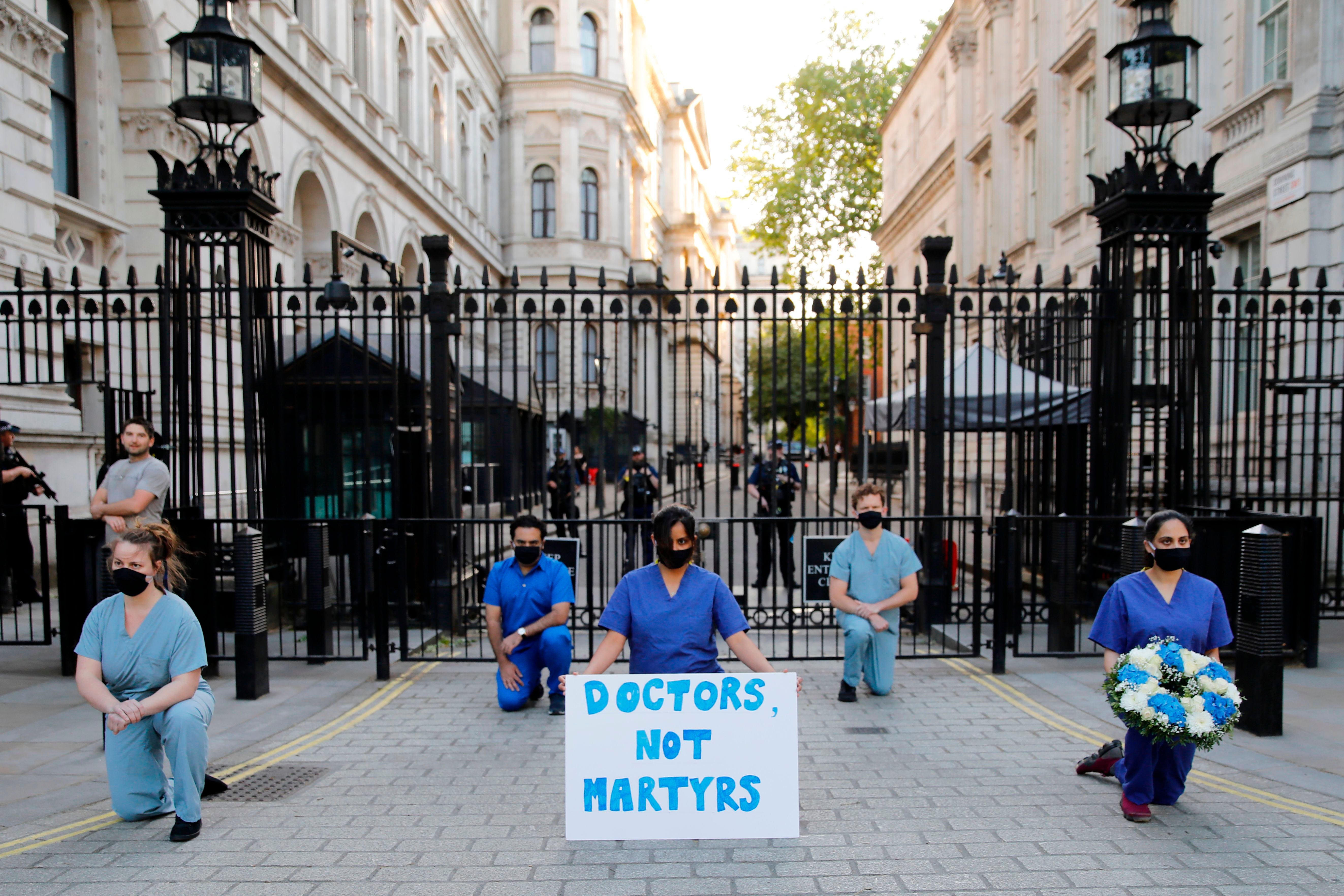There’s a better way to mark the pandemic than praising ‘heroes’ and ‘sacrifice’
We need to be cautious about pivoting to narratives of heroism, which the British government is undeniably pushing us towards


Your support helps us to tell the story
This election is still a dead heat, according to most polls. In a fight with such wafer-thin margins, we need reporters on the ground talking to the people Trump and Harris are courting. Your support allows us to keep sending journalists to the story.
The Independent is trusted by 27 million Americans from across the entire political spectrum every month. Unlike many other quality news outlets, we choose not to lock you out of our reporting and analysis with paywalls. But quality journalism must still be paid for.
Help us keep bring these critical stories to light. Your support makes all the difference.
In his message of support for the National Day of Reflection last year, Boris Johnson offered ‘sincere condolences’ to the bereaved, but his message quickly pivoted toward a celebration of ‘the great spirit shown by our nation’. This was embodied, he said, by medical staff, carers, those working on the vaccine, and even everyone who followed social distancing rules (a point that since “partygate” now reads especially awkwardly). This broader framework of remembrance was also gestured toward when he announced the creation of a UK Commission on Covid Commemoration.
For the prime minister, remembrance is not just about mourning but also national self-validation. It is easy to see the political angle in this. Given the questions that hang around its handling of the pandemic, it is obviously more comfortable for the government to talk about heroism than death. The UK Commission on Covid Commemoration was announced last May but no-one’s heard anything since then. During partygate it was likely just too incendiary. Again, the commission is pitched in quite celebratory terms.
On Wednesday it will be two years since the start of the first UK lockdown and, for the second time, it has been chosen for a National Day of Reflection. For Marie Curie, the charity that first campaigned for this event, it is about contemplating lives lost and creating collective support for the bereaved. But in research I conducted on the issue, I found big differences in how Britons publicly remember the pandemic.
Last November, a new memorial was unveiled in Barnsley that explicitly merged ‘paying tribute to those who have lost their lives’ with marking the ‘contribution of key workers, volunteers and local communities during the pandemic’. This achievement-oriented approach chimes with the new statue of fundraiser Captain Sir Tom Moore and the planned depiction of a PPE-clad nurse at the 999 Cenotaph. Remembering the pandemic through a prism of overcoming adversity makes us feel positive, unified, and evokes associations with the way we habitually remember military conflicts.
But we need to be cautious about pivoting to narratives of heroism – which the British government is undeniably pushing us towards – in comparison to those of loss and grief.
If our public reflection on the pandemic becomes only a celebration, it will be a form of forgetting. We need to acknowledge the hugely commendable deeds that have been enacted since March 2020, but at the core of remembrance must be a story of lives cut short and an exhortation to show solidarity with the bereaved.
While the deaths of some front line workers might be framed as heroic, we should acknowledge that most fatalities from COVID-19 evoke only grief, and have little to do with martyrdom or redemptive overcoming. Focusing on “the great spirit shown by our nation” also risks obscuring the different ways the pandemic has been experienced.
The impacts of Covid-19 for different individuals have spanned anything from serious illness, to significant grief and hardship, to what is essentially just inconvenience. The extent to which rates of mortality varied with ethnicity should also prompt renewed discussions about racial injustice. That can more easily be papered over by focusing on collective sacrifice.
To keep up to speed with all the latest opinions and comment sign up to our free weekly Voices newsletter by clicking here
In Britain, one of the most striking acts of public response to the pandemic was the Thursday ‘Clap for Carers’, a ritual that embodied this desire to collectively praise heroes. But the clap also highlighted its difficulties. Subsequent survey data has shown that NHS staff ultimately had mixed feelings about the event, with some concerned that it became superficial and politicised.
In my interviews with organisers of grassroots remembrance initiatives, many were suspicious of the idea the UK government could lead public memorialisation. Fran Hall from the Covid-19 Bereaved Families for Justice said, due to the “huge amount of anger focused directly at the state,” it would be jarringly inappropriate for “the government to then bestow a memorial of some kind.”
Dr Joseph Freer is especially scathing of politicians emphasising sacrifice: “it is not likely that sacrifice is how nurses themselves would have seen their own deaths – it is more probable that they felt unsafe and afraid.”
The National Day of Reflection is a broad and inclusive event. It is up to all of us to resist those comforting modes of memory that try to draw redemption out of suffering. Especially when the government wants to either celebrate or just forget the pandemic.
David Tollerton, Associate Professor at the University of Exeter
Join our commenting forum
Join thought-provoking conversations, follow other Independent readers and see their replies
Comments